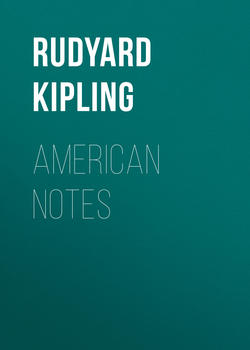Читать книгу American Notes - Rudyard Kipling - Страница 3
II. AMERICAN POLITICS
ОглавлениеI HAVE been watching machinery in repose after reading about machinery in action.
An excellent gentleman, who bears a name honored in the magazine, writes, much as Disraeli orated, of “the sublime instincts of an ancient people,” the certainty with which they can be trusted to manage their own affairs in their own way, and the speed with which they are making for all sorts of desirable goals. This he called a statement or purview of American politics.
I went almost directly afterward to a saloon where gentlemen interested in ward politics nightly congregate. They were not pretty persons. Some of them were bloated, and they all swore cheerfully till the heavy gold watch-chains on their fat stomachs rose and fell again; but they talked over their liquor as men who had power and unquestioned access to places of trust and profit.
The magazine writer discussed theories of government; these men the practice. They had been there. They knew all about it. They banged their fists on the table and spoke of political “pulls,” the vending of votes, and so forth. Theirs was not the talk of village babblers reconstructing the affairs of the nation, but of strong, coarse, lustful men fighting for spoil, and thoroughly understanding the best methods of reaching it.
I listened long and intently to speech I could not understand – or but in spots.
It was the speech of business, however. I had sense enough to know that, and to do my laughing outside the door.
Then I began to understand why my pleasant and well-educated hosts in San Francisco spoke with a bitter scorn of such duties of citizenship as voting and taking an interest in the distribution of offices. Scores of men have told me, without false pride, that they would as soon concern themselves with the public affairs of the city or state as rake muck with a steam-shovel. It may be that their lofty disdain covers selfishness, but I should be very sorry habitually to meet the fat gentlemen with shiny top-hats and plump cigars in whose society I have been spending the evening.
Read about politics as the cultured writer of the magazine regards ‘em, and then, and not till then, pay your respects to the gentlemen who run the grimy reality.
I’m sick of interviewing night editors who lean their chair against the wall, and, in response to my demand for the record of a prominent citizen, answer: “Well, you see, he began by keeping a saloon,” etc. I prefer to believe that my informants are treating me as in the old sinful days in India I was used to treat the wandering globe-trotter. They declare that they speak the truth, and the news of dog politics lately vouchsafed to me in groggeries inclines me to believe, but I won’t. The people are much too nice to slangander as recklessly as I have been doing.
Besides, I am hopelessly in love with about eight American maidens – all perfectly delightful till the next one comes into the room.
O-Toyo was a darling, but she lacked several things – conversation for one. You cannot live on giggles. She shall remain unmarried at Nagasaki, while I roast a battered heart before the shrine of a big Kentucky blonde, who had for a nurse when she was little a negro “mammy.”
